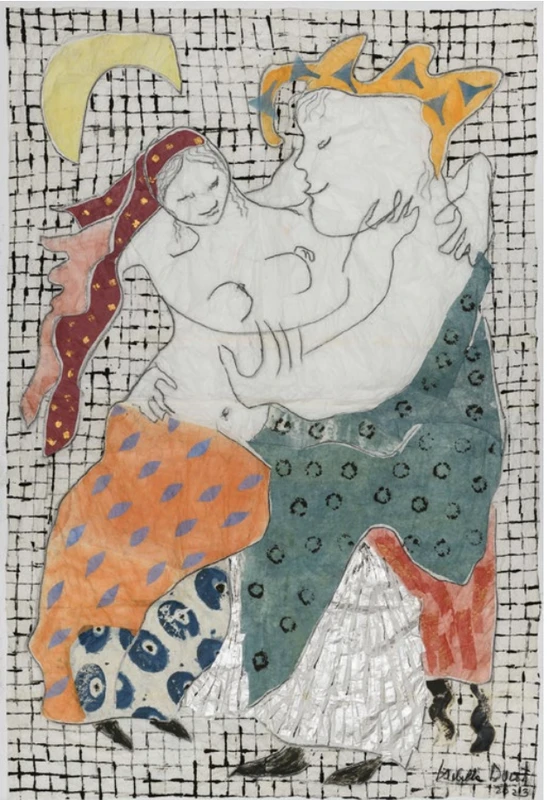Isabella Ducrot: other things
29 Mar-5 May 2023
PV 29 Mar 2023, 6-8pm


other things is the first solo show in Britain by Isabella Ducrot, in a career spanning four decades. Ducrot was born in Naples in 1931 and has been based in Rome for sixty years. Employing diverse media – including pencil, pastel, ink and watercolour – her works compress an array of cultural references, encompassing philosophy, folklore and textile weaving. At both intimate and expansive scales, she draws upon and reinterprets the rare textiles that she has collected from different parts of the world.
The exhibition consists of works made over the past five years, spanning series including ‘Tendernesses’, ‘Bella Terra’ and ‘Pots’. Respectively, these portray godlike figures inspired by Persian miniatures (realised at an incongruously large scale), a landscape in different seasons, and still-life arrangements of flowers. Made on parchment-like sheets of handmade paper and thin cotton, the works reflect the artist’s enduring interest in pattern, and in the capacity for memory and narrative to be refracted into schematic form – ‘rewoven’, that is, via an array of repeating marks and motifs.
Ducrot’s art oscillates in scope between local, intimate detail and a ranging sense of time and history. Her origins in Naples continue to shape her practice – she has drawn a link between the city’s extravagant buildings and the elastic sense of space in many of her compositions: “Neapolitan architecture has given me a taste for ‘waste’ – the useless, empty spaces of buildings in Naples. For instance, in the Capodimonte Palace, the space dedicated to windows is absurd: inside the space of a balcony, one could easily arrange a miniature apartment … I like this kind of expenditure, this useless waste.”
The power of otiose space combines, in Ducrot’s depictions of flowers, with an affinity for the domestic and the small-scale. The flowers and ceramic vessels are rendered through various combinations of ink and collage, on grounds of blank paper (or, in some cases, turquoise pigment). The sparing arrangements symbolise, for Ducrot, an “idea of happiness: happiness for me is being seated around a table with one friend, with more friends, with family … cups of tea, tea pots, pots. I love Japan for its cult of pots.” Such a convergence of daily reality, interior life and broader cultural reference has been a defining characteristic of her work from the outset.
In this way, Ducrot’s works vary in import as much as in scale – from the shifting seasons and ambiences of the ‘Bella Terra’ pictures, each depicting a tree alongside flowing water, to the allegoric quality of the ‘Tendernesses’. In these, voluptuous figures – rendered in loose, linear fashion – meet in an erotic embraces. Each ‘demigod’ is glorified by a halo and a robe adorned with clustering shapes – the two garments describing an abstract landscape. The figures are at once cosmic and earthily human. The latent classicism in the ‘Tendernesses’ – their evocation of pagan deities – equates with Ducrot’s formative experience of Naples. She has spoken of the influence of “the blond colour of the walls, of the ground, the irruption of the primitive: you turn the corner of an old palace and you might meet a faun playing his flute. I miss this aspect of my native land – the Greek.”
Isabella Ducrot lives and works in Rome. Her work has been exhibited internationally since the mid-1980s, including at the Venice Biennales of 1993 and 2011. She is the author of numerous philosophical and art-historical essays, including the books Twenty-Two Places of the Soul (2022), Women’s Life (2021) and The Checkered Cloth (2019) all published by Quodlibet. In January 2023, the publishing house released a new catalogue, entitled Isabella Ducrot: Stoffe (Isabella Ducrot: Fabrics), an in-depth anthology of the artist’s exquisite collection of rare fabrics amassed over the course of her lifetime; presenting two hundred and fifty-two fabrics that originate from across four continents.